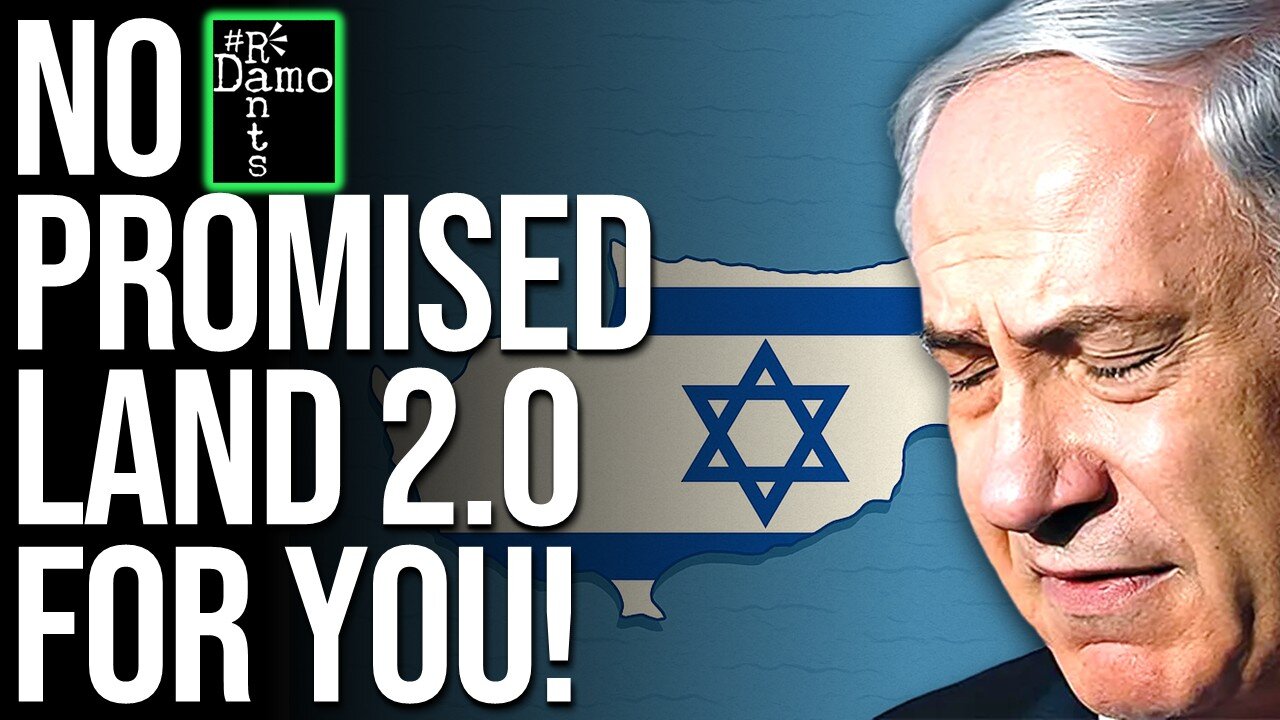Premium Only Content

Israel’s Developers Thought Cyprus Was an Easy Target – Then Came Five Years in Prison
Right, so they said it was overthinking. They said Cypriots were being dramatic. They said that concerns about Israeli land buying on the island, in light of the land and property seizures observed in Palestine were paranoid nonsense, it couldn’t happen here and that anyone raising the alarm about such things just didn’t understand how investment works and might perhaps just be an antisemite. And then a Cypriot court sentenced an Israeli businessman to five years in prison for developing property in the Turkish-controlled north that still legally belonged to Greek Cypriots displaced in 1974. An Israeli stealing land for development in Cyprus then is it? Suddenly the hysteria didn’t look so hysterical. Suddenly the warnings didn’t look so wild. The thing people were told could never happen had already happened — and it took a criminal prosecution to force everyone to say it out loud. An Israeli has been caught doing in Cyprus what they’ve done for years in Palestine. So how come they can be prosecuted for it in one state, but not the other then?
Right, so an Israeli caught involved in selling land that didn’t belong to them, happening in Cyprus, where warnings about the scale of Israeli purchases on the island have been warned about and ignored. Well the break came in a courtroom in the end. Not in a policy paper, not in a parliamentary debate, but in the one place where the state has to stop pretending it didn’t know what’s going on. A Cypriot judge sentenced Israeli businessman Shimon Aykut to five years in prison for developing land in the Turkish-controlled north of Cyprus that is still legally owned by Greek Cypriots displaced in 1974. He pleaded guilty to forty charges related to unlawful development and sale of property that did not belong to him. His defence said he was acting as support for his son, who oversaw the companies involved, and that his health should be considered. The court recognised a crime of continuation though: displacement did not end in 1974; it continues wherever the ownership of that land is overridden. A prison sentence made that plain.
This was the moment the old assumption stopped working. For years, Cypriots raising concerns about the scale and nature of Israeli property purchases on the island were dismissed. They were told it was paranoia, exaggeration, or nationalist panic. They were told that property is just property, that the housing market is simply a market, and that foreign capital is a sign of economic confidence. They were told they were imagining threats. Then a developer was convicted for doing exactly what they warned would happen.
The conviction did not create the problem. It exposed it.
Cyprus is a divided island. The division is not symbolic. It is territorial, enforceable, and unresolved. Greek Cypriots displaced in 1974 retain legal ownership of land in the north under international law. They cannot return to it. The land is theirs by title, memory, and legal right. It is denied to them in practice. This creates a situation where land exists in a suspended state: owned but inaccessible. It is not abandoned. It is withheld. Any development or sale of that land without the consent of the owner is not a transaction. It is the ongoing reality of displacement. Something Israel knows a lot about, they’ve been doing it in Palestine for decades.
The Aykut case made that clear. It established, in enforceable legal terms, that attempting to profit from land held under displacement is not business. It is a continuation of dispossession. That is not ideology. That is the legal structure of the case. Once recognised in court, it can no longer be dismissed politically.
The significance of the case becomes sharper when placed alongside the documented scale of Israeli property purchases in the Republic of Cyprus in recent years. According to publicly reported real estate data cited in HIC-MENA, Israeli nationals have purchased significant volumes of property across key coastal districts: approximately 1,406 in Larnaca, 1,154 in Limassol, and 1,291 in Paphos between 2021 and 2024. Many of these transactions included title deeds. These numbers indicate not incidental or tourist-level purchasing, but sustained acquisition. The shape of that acquisition has also been reported as extending beyond individual residential units to land parcels and multi-unit developments. It is a pattern of presence, not holiday homes.
Presence matters. This is not speculation. The distribution of land ownership shapes who can live where, who can afford to remain, and who is pushed outward. When property markets shift in favour of foreign capital, the people who live in those areas lose bargaining power. The cost of living follows ownership, and ownership follows capital. Housing pressure in coastal cities such as Limassol and Larnaca has already been noted as rising. This is a documented social and economic effect, not a projection.
When a country with an unresolved history of displacement experiences large-scale foreign acquisition of property, the risk is not theoretical. Territorial change can occur without soldiers or declarations. It can occur through transactions. If presence consolidates through development, it establishes facts on the ground that become difficult to reverse. This logic is well understood in the context of settlement expansion in the West Bank. The concern in Cyprus is not that the situations are identical. It is that the underlying mechanism — presence preceding claims — is recognisable.
The warnings in Cyprus reflected this. Political voices, particularly within the left, raised concerns about the cumulative effect of foreign acquisition on territorial stability and social continuity. These warnings were reported publicly. They were dismissed by others as alarmist. The argument put forward in dismissal was that investment benefits the economy and that treating land as a commodity is modern and pragmatic. This argument assumes that land can be separated from history. In Cyprus, it cannot.
Land in Cyprus is not blank economic space. It is the memory of loss and the foundation of identity. When property belonging to displaced families is treated as an opportunity for development, the state is confronted with the question of what sovereignty means if the displaced cannot return, and others can build. The Aykut case forced this question out of the theoretical and into the material.
This is the point at which the issue becomes one of state responsibility. A country does not defend its sovereignty only at its borders. It defends it in its land registry. It defends it in its planning regulations. It defends it in its housing policy. If land is treated only as a commodity, sovereignty can be eroded without a single soldier crossing a line. The mechanism is economic, not military. The outcome though is the same. Those with capital occupy the space, and those without are displaced from it.
The state of Cyprus now faces a choice. Either land is recognised as part of national continuity — belonging to the people who live on it and remember it — or it is treated as an asset to be traded. The first path requires regulation, enforcement, and political clarity. The second path allows displacement to continue through market forces rather than invasion. Yet to the people of Cyprus, all these Israelis buying up land and property might well feel like an invasion.
The Aykut conviction demonstrated that displacement is not a past event. It is ongoing. The legal owners of the land were not consulted. They did not consent. That is the definition of dispossession. The state recognised it and sentenced it. This recognition cannot now be ignored. If only Palestine had the same rights, but such is life under illegal occupation, by Israel again, seizing land illegally and it seems that attitude prevails in other states as well, though in this instance, unsuccessfully.
The wider context matters here. Cyprus has lived for decades with the unresolved consequences of 1974. The displacement did not just remove people from their homes; it altered the meaning of territory itself. Land became divided into what is held in law and what is held in force. Greek Cypriots hold legal ownership in the north without physical access. Turkish authorities hold physical control without international recognition. This suspended condition is fragile. It relies on the assumption that neither side will undertake actions that further entrench or expand the consequences of the displacement.
The Aykut case shows that this assumption is already under strain. Development is not neutral. Once land is built on, it is altered. Once a property is sold, lived in, and integrated into economic circulation, it becomes harder to restore its former status. The law can say ownership remains, but the material reality shifts. This is how territorial change occurs without negotiation or declaration. It is incremental, everyday, administrative. It does not need dramatic events to be effective. It only needs to continue without intervention.
This is the risk Cyprus faces if it treats land primarily as a market commodity. It’s capitalism screwing up again. The displacement that happened once can happen again by different means. The mechanism would be financial rather than military, but the outcome would be similar: people removed from the land that gives them place and continuity, replaced by those with greater purchasing power. This is not framed as accusation, though the fact an Israeli took advantage of this speaks volumes given their high profile conduct and land seizure elsewhere. It is the predictable outcome of leaving territory to the logic of global capital.
In this context, the scale of Israeli property acquisition in the south matters. It is not about nationality alone. Cyprus has long had foreign buyers: British retirees, Russian capital, investors from wherever else. The difference here is twofold. First, the scale of purchase by Israeli nationals accelerated rapidly within a short timeframe and since the events of June when Iran struck Israel in retaliation for Israeli strikes on them, many people able to flee to Cyprus did. Second, the purchases include land parcels and multi-unit development footprints rather than dispersed private residences. This changes the nature of presence. It shapes not only who owns property, but who defines the character and accessibility of the built environment.
HIC-MENA’s reporting on acquisition numbers is therefore not incidental. It provides evidence that this is not a marginal phenomenon. It is a shift in territorial and economic composition. And in a divided country, territory is identity, stability, and power.
The question now is not whether a problem exists. The prosecution made that unavoidable, that matter is settled. The question is what the state will do. Cyprus can regulate foreign acquisition. It can define zones where local ownership is prioritised. It can tie property rights to residency. It can place limits on contiguous purchases. It can treat land as the foundation of sovereignty rather than as a commodity for external investment. These policies are neither extreme nor unusual. States use them when they recognise that territory is not just a resource but a basis of political continuity.
If Cyprus chooses not to act, the market will continue to determine ownership. In such a scenario, the displacement that took place through conflict will be followed by displacement via pricing pressure and land consolidation. The memory of lost land in the north will be joined by the experience of being priced out of land in the south. The country will have failed to defend its territorial integrity not because it lacked power, but because it chose not to use it.
The Aykut case is therefore not simply a legal event. It is a moment of clarity. The state has acknowledged that land belonging to the displaced remains theirs. This acknowledgement must extend beyond the courtroom. It must inform policy. If land is treated as heritage, it can be protected. If land is treated as commodity, it can be lost.
What comes next will determine whether Cyprus remains a sovereign territory of its people or becomes a location managed by external capital flows of which a large and concerning part appears to be Israeli. The difference is not ideological. It is practical. It concerns who can live where, who can afford to stay, who is pushed out, and who builds the future shape of the country.
The old assumption has collapsed. Foreign property acquisition cannot be treated as economically neutral. It has territorial consequences. The prosecution proved that in law. The data demonstrates it in practice. The political warnings now stand vindicated.
The state must decide whether to respond to this, especially since long declared Cypriot concerns about Israeli buyers has now been founded.
If Cyprus does not act now, the next displacement will not require soldiers or forced evacuation. It will come in the form of gradual, normalised replacement. It will appear as market activity. It will be described as development. It will be justified as growth. Yet where do ordinary Cypriots then go if we see this thought process through to its logical conclusion?
For more on what happened in Cyprus back in June of this year, when Cypriot concerns were again voiced loudly and again ignored over the sudden influx of Israelis arriving on the island to escape Iranian strikes, check out this story here as your suggested next watch.
Please do also hit like, share and subscribe if you haven’t done so already so as to ensure you don’t miss out on all new daily content as well as spreading the word and helping to support the channel at the same time which is very much appreciated, holding power to account for ordinary working class people and I will hopefully catch you on the next vid. Cheers folks.
-
 14:54
14:54
The Kevin Trudeau Show Limitless
1 day agoThe Hidden Force Running Your Life
30.5K6 -
 LIVE
LIVE
freecastle
5 hours agoTAKE UP YOUR CROSS- Do not be deceived: 'Bad company ruins good morals.
97 watching -
 LIVE
LIVE
The HotSeat
2 hours agoWatching Them Implode.....Fun To Watch!!!
253 watching -
 LIVE
LIVE
Owen Shroyer
1 hour agoOwen Report - 10-30-2025 - Trump Threatens To Bring Back Nuclear Bomb Testing
1,194 watching -
![[Ep 781] Arctic Treason – Smith, Boasberg, Deep State Coup | TPUSA Revival! | Joe Autopen](https://1a-1791.com/video/fww1/98/s8/1/E/H/c/v/EHcvz.0kob.1-small-Ep-781-Arctic-Treason-Smith.jpg) LIVE
LIVE
The Nunn Report - w/ Dan Nunn
3 hours ago[Ep 781] Arctic Treason – Smith, Boasberg, Deep State Coup | TPUSA Revival! | Joe Autopen
174 watching -
 1:05:14
1:05:14
The Quartering
3 hours agoSocial Order Has Collapsed
93.6K22 -
 1:12:11
1:12:11
DeVory Darkins
5 hours agoKamala STUNNED after brutal question from reporter as Trump DOMINATES CHINA MEETING
118K90 -
 3:34:09
3:34:09
Due Dissidence
7 hours agoMegyn Kelly GASLIGHTS Candace Fan, Tucker TORCHES Christian Zionism, Israel BREAKS CEASEFIRE AGAIN
18.5K27 -
 59:52
59:52
Mark Kaye
5 hours ago🔴 5 Reasons JD Vance WILL Be The Next President
27.3K7 -
 21:08
21:08
Professor Nez
4 hours agoTrump Just BROKE the ENTIRE Democrat Party with one Line!
24K34